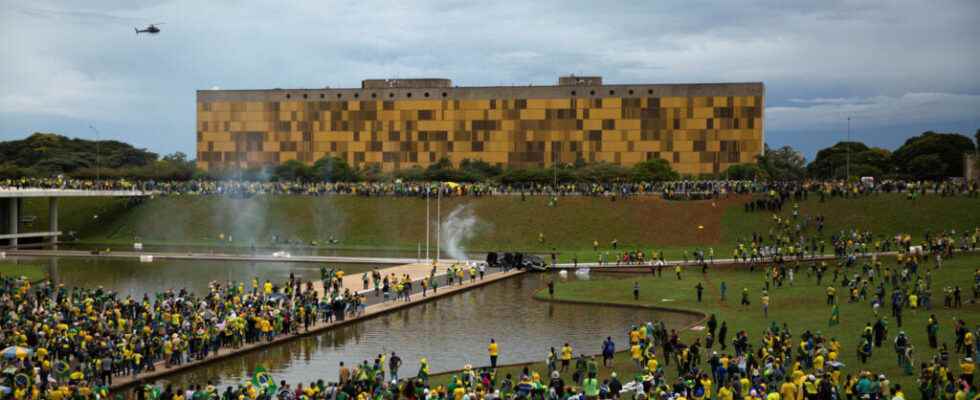Thousands of supporters of former President Jair Bolsonaro invaded Congress, the presidential palace and the Supreme Court in Brasilia on Sunday, a week after the inauguration of leftist President Lula. The security forces seemed overwhelmed. However, the warning signs were numerous.
What surprised was the ease with which the demonstrators approached the official buildings, when we knew that there were tensions, that many supporters of Jair Bolsonaro disputed the victory of Lula and sought to fight it out. , remember Martin Bernard, our correspondent in Brazil. The demonstrators broke through a police checkpoint, apparently without much resistance, and they destroyed everything in their wake in the presidency, in Congress and in the Supreme Court. If the authorities seemed overwhelmed, Bolsonarian activists had been talking about violent action for months. As soon as Lula’s victory, hundreds of pro-Bolsonaro people began to camp in front of army headquarters to demand a coup. At the end of December, the police foiled an attempted attack.
“ The different groups have organized themselves in recent months »
Brasilia, São Paulo, Rio, Belo Horizonte… In all major cities, the Bolsonarists were still camping until Friday, when the police evacuated them. Before they return to the premises the next day. Buses full of Bolsonaro supporters then kept arriving on Sunday, while on the networks, calls for violence and insurrection became increasingly violent. The media and pro-Lula elected officials were then forced to sound the alarm.
For Odilon Caldeira Neto, professor of history at the Federal University of Juiz de Fora and coordinator of the far-right observer, ” it was planned. The various groups have organized themselves in recent months, articulated by Bolsonaro then mobilized by certain soldiers such as General Braga, General Augusto Heleno. And they had the financial support of business leaders in strategic financial sectors for the Bolsonaro camp, such as the agribusiness sector. Furthermore, it should be noted that certain sectors of the military police, which had already shown a certain degree of bolsonarization in recent years, have been more than lax in the face of anti-democratic agitations “, he underlines.
What role for the security forces?
These are all elements that raise the question of the role of the security forces. The pro-Bolsonaro seem to have benefited from complicity with the security forces in Brasilia. And on Saturday, Brasilia’s security chief, Anderson Torres, left the country for Florida where Jair Bolsonaro is still.
President Lula declared federal intervention, with the support of the army, to restore order in Brasilia. Lula called these protesters ” fanatical fascists ” who “ will pay for this undemocratic gesture “.
These images are reminiscent of the storming of the Capitol two years ago in the United States. It is a frontal attack on Brazilian democracy, a week after Lula’s inauguration. “ But it is also necessary to underline the Brazilian peculiarities, Odilon Caldera Neto point. The question of militarization is even more important in the Brazilian case, because it is based on the presence of the military in Brazilian politics, which is a tradition of authoritarian thought and practice, as well as extreme Brazilian right. Moreover, the Brazilian episode is even more traumatic because the Lula government already exists, it has already been invested. So I would say that there is a clear resemblance with the United States: the conspiracy myths are evoked in the same way, but the intensity and the political impact of the events in Brazil are even more serious. »
A flash
Minister of Justice Flavio Dino spoke of “ terrorism and condemned the putschists “. There were no shootings or deaths. From this point of view, it is rather a coup d’etat than a coup d’etat. But it is an unprecedented fact and it will deeply mark the start of Lula’s third term.
Leading figures played a role in these events and the radicalization of the demonstrators, believes the coordinator of the far-right observer: ” Ernesto Araujo, for example, former Minister of External Relations, posted videos in support of anti-democratic escalation. There are also Bolsonarist figures within the police. So the problem of Bolsonarism, as an articulated expression of the extreme right in Brazil, is far from being resolved. This event has a dimension of apotheosis, but it is part of a broader dynamic of radicalization and articulation of anti-democratic elements. »
►Also read : After their rampage in Brasilia, the national political institutions are once again under control
.
